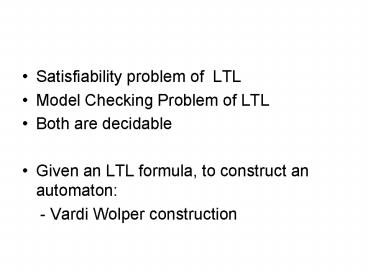Satisfiability problem of LTL - PowerPoint PPT Presentation
1 / 28
Title:
Satisfiability problem of LTL
Description:
dynamically growing and shrinking number of processes ... a model is built using PROMELA. property is specified. SPIN works as a verifier ... – PowerPoint PPT presentation
Number of Views:77
Avg rating:3.0/5.0
Title: Satisfiability problem of LTL
1
- Satisfiability problem of LTL
- Model Checking Problem of LTL
- Both are decidable
- Given an LTL formula, to construct an automaton
- - Vardi Wolper construction
2
Correctness of formula automaton
- Soundness Every string accepted by A? is a
model of the formula ? - Completeness Every model which satisfies the
formula ?, is accepted by A? - Proof by induction
3
SPIN
- Tool for formal software verification of systems
- Open source written in C
- Developed at Bell Labs in 1981
- System Software award by ACM in 2001
- System description is by PROMELA (PROcess MEta
LAnguage)
4
SPIN is used to
- Trace logical design errors in
- - distributed systems design such as
- -operating systems
- -data communications protocols
- -switching systems
- -concurrent algorithms
- checks the logical consistency of a specification
- provides direct support for the use of embedded
C code as part of model specifications
5
Tool supports
- dynamically growing and shrinking number of
processes - Synchronous or asynchronous (buffered) message
passing, and communication through shared memory
6
To verify a design
- a model is built using PROMELA
- property is specified
- SPIN works as a verifier
7
Three modes of SPIN
- simulator allowing for rapid prototyping with a
random, guided, or interactive simulations - exhaustive verifier, capable of rigorously
proving the validity of user specified
correctness requirements - proof approximation system that can validate even
very large system models with maximal coverage of
the state space
8
PROMELA
- PROMELA is a verification modelling language
- Promela programs consist of processes, message
channels, and variables - Processes are global objects
- Message channels and variables can be declared
either globally or locally within a process
9
Conditions and statements in PROMELA
- In Promela there is no difference between
conditions and statements - Statements are either executable or blocked
- while (a ! b) skip / wait for ab /is
written as - (a b) in PROMELA
10
- A condition can only be executed when it holds.
If the condition does not hold, execution blocks
until it does - Declarations and assignments are always
executable
11
Basic data types
- bit or bool
- Byte
- Short
- int
- bool flagint statebyte msg
12
Process
- The behavior of a process is defined in a
proctype declaration - proctype A() byte state state 3
- The process type is named A
13
Two processes
- byte state 2 proctype A() (state 1) -gt
state 3 proctype B() state state -
1
14
- A proctype definition only declares process
behavior - Initially one process will be executed a
process of type init - init skip
- init run A() run B()
15
- proctype A(byte state short foo) (state
1) -gt state foo init run A(1, 3) - Data arrays or process types can not be passed as
parameters - Run statements can be used in any process to
spawn new processes
16
Message passing
- Message channels to pass info between processes
- chan qname 16 of short
- chan qname 16 of byte, int, chan, byte
- qname!expr sends the value of expr
- qname?msg receives message
17
Control Flow
- Selection
- Repetition
- Unconditional jumps
18
Selection
- if (a ! b) -gt option1 (a b) -gt
option2fi - Mutually exclusive guards or not
- Non-deterministic selection
19
Repetition
- byte count proctype counter() do
count count 1 count count - 1
(count 0) -gt break od
20
- proctype counter() do (count ! 0)
-gt if count count 1 count
count - 1 fi (count 0) -gt
break od
21
Unconditional Jumps
- proctype Euclid(int x, y)
- do
- (x gt y) -gt x x - y
- (x lt y) -gt y y - x
- (x y) -gt goto done
- od
- done
- skip
22
Assertions
- assert(any_boolean_condition)
- Always executable
- If condition holds statements has no effect
- If not the error report is produced
23
some other useful aspects
- Time-out statements
- Pseudo Statements
- Progress-State Labels
- End-State Labels
24
SPIN
- Given a model system specified in Promela
- Spin can either
- -perform random simulations
- -it can generate a C program that
- performs verification of the system
- state space
- Different options
- spin option input file name
25
References
- www.spinroot.com
- Model Checking, Clarke, Grumberg, and Peled, MIT
Press, 2000
26
(No Transcript)
27
(No Transcript)
28
- spin option input file name
- Output is written to set of C files pan.
- To guarantee an exhaustive exploration of the
state space, the program can be compiled using - - gcc -o pan pan.c
- For large systems
- - gcc -DBITSTATE -o pan pan.c

